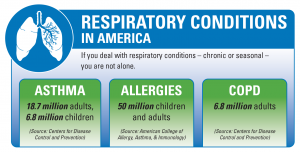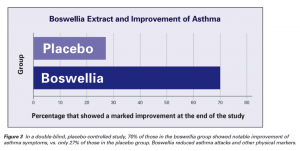TREAT AND PREVENT RESPIRATORY ILLNESS WITH BOSWELLIA
INFOMEDICA’S BOTTOM LINE:
If your patient suffers from any kind of respiratory condition—whether it is seasonal like allergies, conditional like asthma, or chronic like COPD, stopping this cycle of symptoms and finding relief can seem very difficult.
Conventional treatments can cause a multitude of side effects, but there is a better way. Boswellia, combined with other powerful botanicals, helps stop inflammatory triggers that cause these conditions. Together, they can provide relief for:
Asthma
- Stops excessive 5-LOX activity, reducing leukotrienes and inflammation
- Clinically tested results—70% saw improvement!
Allergies
- Inhibits mast cells that trigger histamine
- Helps move mucus out of the body to clear the lungs and bronchial airways
COPD
- Inhibits HLE, alleviating “shortness of breath” feelings
- Reduces spasmodic coughing and discomfort
Sometimes, Breathing Isn’t Easy
Many of us take our breathing for granted, without a thought about how fortunate we are. But for those with asthma, seasonal allergies, sinusitis, chronic obstructive pulmonary disease (COPD), and other respiratory concerns, just taking a breath is a challenge. However, a combination of boswellia and other effective botanicals can help patients overcome the symptoms of all kinds of respiratory conditions and let them breathe easy again.

Boswellia—A Botanical That Works With You, Not Against You
Whether the concern is asthma, allergies, COPD, or just seasonal respiratory colds, the right boswellia extract can get your patient breathing easily again. Boswellia opens airways, reduces bronchial and sinus swelling, and helps relieve the worst of allergy symptoms. Boswellia is a specific inhibitor of the 5-LOX enzyme, an inflammation trigger almost no other medicine can touch. This makes boswellia extremely effective at treating lung problems, many of which are associated with excessive 5-LOX activity.
Asthma. When someone has an asthma attack, their bronchial airways narrow and tighten. The inflammation produces mucus, which adds to the “out of breath” feeling. Severe attacks can be very frightening, and unfortunately, the anxiety over possible attacks can make even mild symptoms much worse.
Don’t recommend your patient throw away their inhaler and take boswellia instead, the good news is that clinical studies using boswellia to treat asthma have been positive.
In a double-blind, placebo-controlled, 6-week clinical study, boswellia was tested in 40 individuals with asthma, ranging from 18 to 75 years old and a mix of 23 men and 17 women. At the end of the study, 70% showed marked improvement!

In another clinical study showing similar results, boswellia was one of three botanicals in a combination. In this placebo-controlled study, 63 patients were divided into two groups; one received the herbal combination [boswellia, licorice root (Glycyrrhiza glabra) and turmeric root (Curcuma longa)], the other a placebo. At the end of the 4 week study, the herbal group showed a statistically significant drop in leukotriene levels and other inflammatory markers compared to the placebo group.
Allergies. Unfortunately, conventional treatments for the sneezing, itching, and runny eyes and nose caused by allergies usually bring unwelcome side effects, including jitteriness, fatigue, mental fog, and irritability. By the end of the allergy season, many find these synthetic “cures” to be worse than the allergy symptoms.
In an allergic response, the body produces compounds that attach themselves to immune system cells, called mast cells. When this happens, the mast cells release large amounts of histamine. The histamine reaction creates swelling and induces more inflammation, redness, and itching.
One scientific study has shown that boswellia can inhibit the action of mast cells and reduce histamine levels. Because boswellia also keeps inflammation at bay, it is perfect for reducing the sinus pressure and swelling that often make allergy flare-ups so miserable.
Sinusitis. A case of sinusitis can be truly debilitating, causing headaches, dizziness, and a feeling of intense pressure through the face. For many people, the conventional choices for sinus relief are not attractive. Like allergy medicines, many synthetic drugs for sinuses either cause jitteriness or grogginess. But here again, boswellia’s anti-inflammatory ability can make a notable difference for your patient without the side effects.
COPD. If the struggle is with COPD (chronic obstructive pulmonary disease), boswellia offers hope, too. Emphysema, chronic bronchitis, and other troublesome respiratory symptoms are triggered, in part, by the human leukocyte elastase (also abbreviated “HLE”). So, not only does someone feel as though they can’t get a “full breath” of air, they may notice more mucus, adding to the “drowning” feeling that this condition brings on.
Fortunately, research shows that boswellia also specifically inhibits this leukocyte, reducing the likelihood of the body’s reaction that causes this response. By reducing the influence and activity of HLE, boswellia stops bronchial inflammation, opening bronchial airways and helps them stay open. It may also reduce the damage to bronchi that occurs over time due to these conditions and their causes.
Choose the Right Boswellia
That brings us to a point about boswellia—it’s important to select the right boswellia extract.
Not all boswellia products are created equal. AKBA, a very important boswellic acid that is strongly anti-inflammatory, can have levels as low as 1% in unstandardized boswellia products. To make sure you recommend the best, look for boswellia standardized to at least 10% AKBA.
Also, researchers found that one of the compounds in boswellia called “beta-boswellic acid,” is actually PRO-inflammatory—clearly the last thing your patient wants when dealing with asthma and other inflammatory lung diseases. The best boswellia extracts reduce beta-boswellic acid to less than 5% of the extract. Unstandardized products can be as much as 25%, so it’s important to know what to look for.
Boswellia is very strong on its own for these conditions, but when blended with additional herbs can make a powerful combination.
Additional Herbs for Easy Breathing
Thyme (Thymus satureioides) provides natural compounds—thymol and carvacrol—that can help deal with the symptoms that make bronchial diseases so difficult to live with. They stop the spasmodic coughing and “tickling” in the throat, relax airways in the lungs, and strengthen the activity of the cilia to help loosen phlegm and keep mucus moving so your patient doesn’t feel clogged up.
Ravintsara (Cinnamomum camphora) has tremendous benefits. Ravintsara is a variety of Cinnamomum camphora used in traditional medicine in Asia, but also introduced to Madagascar over 150 years ago. While the Asian varieties of this tree are used to provide camphor oil, the trees on Madagascar have naturalized over time, and the difference in soil, growing conditions, and climate have given their oils a different chemical profile. In this case, ravintsara has been shown to have strong antibacterial potential.
Other research has found that Cinnamomum camphora extracts effectively reduce inflammation and oxidative stress. Considering the high levels of inflammation involved in any kind of respiratory disease or condition, ravintsara is a definite must.
Myrtle (Myrtus communis) is another botanical used in traditional medicine throughout the Mediterranean. The leaves from this evergreen shrub produce an essential oil that is a strong antioxidant, that has been used as an antiseptic and antibacterial agent, and is excellent for treating bronchial and lung infections.
As a commercially available product, myrtle essential oil has been well-studied and sold in Europe for more than 75 years. And, in the same way as thyme, myrtle stimulates the cilia—the tiny, fluttering projections in the sinus cavities and respiratory system—so mucus can be removed more clearly from the lungs and sinuses.
Breathe Easy and Live Better
The right boswellia extract combined with additional herbal extracts can inhibit the triggers that cause respiratory problems in the first place, relieve symptoms if they should occur, and do this without the side effects of common synthetic drugs. Your patients will be surprised at how good life can be when they can finally breathe easy again—and these botanicals can make it happen!
If your patients are looking to relieve seasonal allergies, asthma, or COPD, recommend taking a combination of boswellia, ravintsara, myrtle, and thyme 2-3 times daily.


